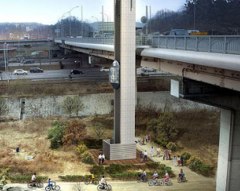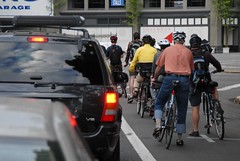
one way Seoul, South Korea hopes
to reach 10% bike mode share by 2020.
(Graphic: Chosun Ilbo)
Seoul, South Korea, a city with just 1.6% of their population regularly using bikes (Portland is at 6% by comparison) has set an aggressive plan to bump that up to 10% by 2020.
They’ve launched several initiatives to reach that goal (like parking and shower facilities at subway stations, bike elevators to get to bridges, and more), but one of them in particular caught my eye because it’s something I’ve been thinking about a lot myself – re-allocating existing roadway space to bike traffic.
According to an article in the Chosun Ilbo, the Seoul city government office of urban traffic will use the “road diet” principle to create bicycle-only lanes on 207 km of roads by narrowing existing motor vehicle lanes.
Another source for the story (thanks for the link Jessica), which is ironically a site about driving cars, puts it this way:
The….plan is based on a “road-diet” programme, under which the number of lanes for passenger vehicles on major roads will be cut to create new cycle paths.
That story also quotes the Mayor of Seoul as saying:
“We will make sure that bicycles will compete with vehicles for commuting in Seoul,” said Mayor Oh, who rides his bicycle to work every day.
And my favorite part of that story — “He did not outline any plan to consult motorists.”
What also makes this news interesting to me is that Seoul is doing this for two reasons you don’t often hear about in the States: to save money and to proactively encourage biking.
In the U.S., politicians and planners seem content to wait until either their hand is forced by community outcry (usually sparked by a serious injury or fatal collision like we saw here in Portland last October) or for bike traffic to reach a breaking point (are we getting close yet?).
In Seoul, they’ve only got about one-third the bike usage rates of Portland, but they’re being proactive in their policies and truly living up to the “if you build it, they will come” mantra.
Seoul is selling their plan to the people by touting that the resulting increase in bike use will save them $547 billion Won (that’s $387 million U.S.) because of reduced pollution alone.
This is inspiring leadership. Portland needs a plan like this, but I realize our political and cultural context is vastly different (in Seoul they replaced a downtown freeway with a river!).
As Seoul’s plan reminds us, we’ve already got the infrastructure we need. There are plenty of multi-lane roads here in Portland that can be re-configured to more safely accomodate bike traffic. There are also many roads that could become safer for bikes if on-street motor vehicle parking was removed.
Back in August, in a report on an event celebrating our Platinum achievement, I wondered if Portland was ready for a “10% by 2010” campaign.
I think we can do it, but it’ll take a bold plan (no such campaign exists in Portland) and proactive leadership to get there.


